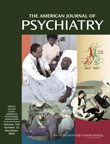Risperidone-Induced Hyperprolactinemia in an Elderly Woman
To the Editor: Risperidone, an atypical antipsychotic, has been reported to cause hyperprolactinemia, which may induce gynecomastia, galactorrhea, amenorrhea, and loss of libido and increase the long-term risk of osteoporosis. However, to our knowledge, all previous reports have focused on premenopausal patients (1, 2), and no geriatric cases have been reported. We present the case of an elderly patient who developed mastitis with risperidone-induced hyperprolactinemia. The lack of menstrual dysfunction and galactorrhea impeded the detection of the hyperprolactinemia side effect, which needs more attention in geriatric patients.
Ms. A, a 72-year-old schizophrenia patient who was married and had three children, had suffered from schizophrenia from age 32. Poor insight and poor drug compliance made her psychiatric condition unstable. She was admitted for auditory hallucinations and religious, persecutory, and somatic delusions. Treatment trials with many conventional antipsychotics had failed to produce any significant improvement. Risperidone was initially administered, at 4 mg/day; 3 months later, the dose was increased to 5 mg/day because Ms. A had not achieved remission.
Two months later, a tender 3×2-cm mass with an erythematous skin change over the left breast was noted, with purulent discharge from the nipple. Two left auxiliary lymph node enlargements (0.9×1.2 cm and 1.5×0.8 cm) were also detected. A medical evaluation revealed an elevated serum prolactin level (104.68 ng/ml). A sonogram-guided biopsy showed edema and diffuse infiltration by leukocytes within lobules, but no abnormal cells were noted. Results of tests for two tumor markers (CEA and CA 153) were both negative. Because of the appearance of mastitis, the oral antibiotic cefadroxil monohydrate was administered, and risperidone was switched to quetiapine, 600 mg/day. Ten days later, the breast mass and lymph node enlargement subsided completely, and Ms. A’s prolactin level fell to 20.55 ng/ml.
To our knowledge, this is the first reported geriatric case of risperidone-induced hyperprolactinemia with mastitis. Kearns et al. (3) reported that the prolactin level is inversely related to the age of risperidone-treated patients, and Kleinberg et al. (4) reported no association between prolactin level and the occurrence of side effects. In this case, the prolactin level was not very high but had led to severe side effects. It is possible that the changing endocrine system of geriatric patients may have different representations of hyperprolactinemia side effects. Although the results of human studies remain inconclusive, animal studies have shown that elevated prolactin levels increase the incidence of spontaneously occurring mammary tumors (5). Since geriatric patients are at higher risk for cancer, greater vigilance for hyperprolactinemia-related side effects is advised, and further research is required.
1. Dickson RA, Dalby JT, Williams R, Edwards AL: Risperidone-induced prolactin elevations in premenopausal woman with schizophrenia (letter). Am J Psychiatry 1995; 152:1102-1103Medline, Google Scholar
2. Caracci G, Ananthamoorthy R: Prolactin levels in premenopausal women treated with risperidone compared with those of women treated with typical neuroleptics (letter). J Clin Psychopharmacol 1999; 19:194-196Crossref, Medline, Google Scholar
3. Kearns AE, Goff DC, Hayden DL, Daniels GH: Risperidone-associated hyperprolactinemia. Endocr Pract 2000; 6:425-429Crossref, Medline, Google Scholar
4. Kleinberg DL, Davis JM, de Coster R, Van Baelen B, Brecher M: Prolactin levels and adverse events in patients treated with risperidone. J Clin Psychopharmacol 1999; 19:57-61Crossref, Medline, Google Scholar
5. Schyve PM, Smithline F, Meltzer HY: Neuroleptic-induced prolactin level elevation and breast cancer: an emerging clinical issue. Arch Gen Psychiatry 1978; 35:1291-1301Crossref, Medline, Google Scholar



